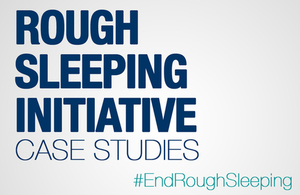Bristol: Prison release worker
Find out how funding from the rough sleeping initiative helped AK break his cycle of rough sleeping, substance misuse and custodial sentences

Rough Sleeping Initiative
The individual
AK, from Bristol, had a long history of rough sleeping, substance misuse and custodial sentences before his recent release from prison. AK had never accessed specialist housing for those with drug or alcohol problems before.
The solution
A rough sleeping initiative funded prison release worker, M, was appointed to work with services inside and outside the prison to help AK.
What happened?
M assessed AK prior to his release to access the information he needed to support AK best, contacting AKs family and adding his information to the Housing Support register.
AK’s parents would not allow him to return to their family home, owing to issues in their relationship and concerns around his substance misuse. M then worked with AK on the day of his release to prioritise him for the Bristol city council substance misuse homeless prevention pathway, supporting him and accompanying him to his appointment.
The result
AK was allocated a place straight away. M supported him with his move, helped him apply for benefits and get the right medical support. AK is still living in supported housing, 3 months after release from prison.
How the government is tackling rough sleeping
The rough sleeping initiative is a cross-government plan of action to significantly reduce the number of people sleeping rough. This is backed by a targeted £75 million fund for local authorities with high levels of rough sleeping to use in 2018 to 2020.
Alongside this, the government’s rough sleeping strategy and its supporting delivery plan lay out plans both to help people who are sleeping rough now, and to put in place the structures needed to end rough sleeping for good.
On 1 October 2018 the Homeless Reduction Act 2017’s duty to refer came into force. The duty to refer means that certain named public bodies must refer users of their service who they have reason to believe are – or are at risk of soon becoming – homeless, to a local authority of the service users’ choice.